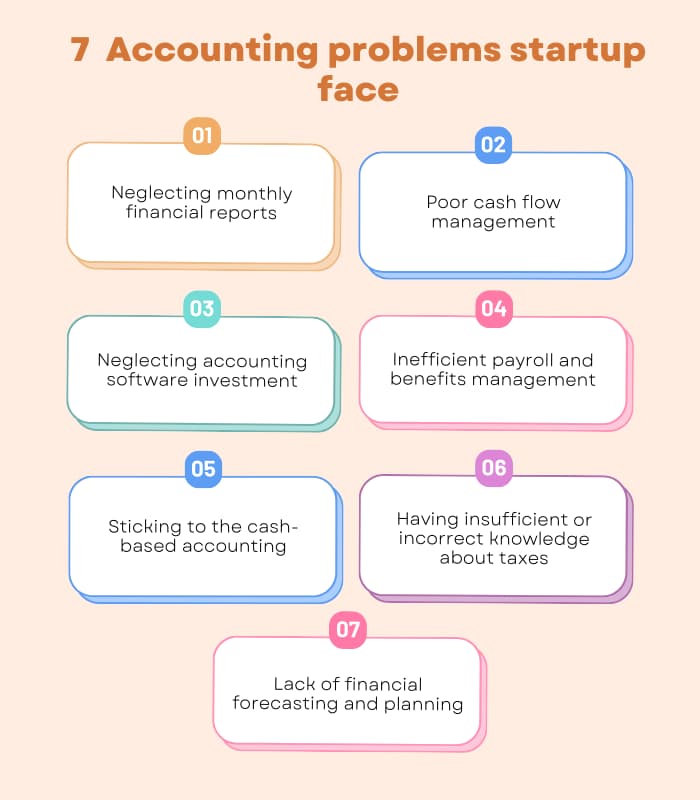Embarking on a journey to a new company is a thrilling endeavour filled with promise and possibility. However, the field of accounting can seem completely frightening to most entrepreneurs. This is particularly true for startups since they must overcome obstacles that make starting well challenging.
In this post, you will learn about the most prevalent accounting problems that startups can face. Comprehending and dealing with these problems will go a long way toward guaranteeing your business’ success and growth. So, let’s quickly review those common accounting problems.
Table of Content
Seven common accounting problems startup face

1. Neglecting monthly financial reports
Several startups underestimate the importance of accounting records as they think it’s enough to produce financial statements once or twice a year.
But, the reality is that if you have financial advisors or are looking to get additional investment for your company, having a monthly financial report is an essential element. It is a great way to demonstrate to your investors how much their stakes mean to you.

Also, the more closely you evaluate your company’s financial operations, the faster you can deal with accounting issues as they appear, like over-sites in slow-paying customers, accounts payable, and others.
2. Having insufficient or incorrect knowledge about taxes
All legal enterprises must register and pay taxes. The law surrounding it can get complicated, particularly for startups. Requirements vary according to numerous variables. Some involve the structure, revenue, and type of companies.
For a startup, it is one of the most susceptible and delicate difficulties as it can mean the distinction between keeping our head above water or going under. Some can handle it independently with their existing employees. That is, if they comprehend all the regulations surrounding taxation.
Others choose to leave that duty to the experts. Since law is complex and can change at a moment’s notice, delegating this task makes sense. There are a lot of companies which excel in handling taxation. For such objectives, you can always visit a specialist.
3. Neglecting accounting software investment
You are making a big mistake if you own an organisation and do not use accounting applications for business calculations. A small mistake while making vital calculations by hand may lead you to unnecessary difficulties.
Many accounting applications are available in the market, and you can choose any of them after thorough research. Here are some fundamental criteria you must consider while selecting an accounting app for your company.
- Budget planning
- Taxation
- Payrolls
- Sales tracking
- Inventory management
- Contact management
- Generating invoices
4. Inefficient payroll and benefits management
Staying on top of benefits and payroll is much more than paying wages on time. Startups also must withhold the right amount of money for taxation, give staff benefits packages, and handle incentives and commissions.
Mishandling employee payroll can give rise to staff dissatisfaction, high turnover, and possible legal complications.
Payroll service providers are a good resource for startups as they can advise on employee perks, tax withholdings, and other related topics. Maintaining a smooth payroll procedure will help your startup comply with local laws and sustain employee morale.
5. Sticking to the cash-based accounting
Many new businesses begin with cash-based accounting, as documenting income as it is received is simple to understand.
However, this approach only works for a short time and can lead to issues for startups as they grow, including limited financial insight and distorted sales results.
However, making the switch to accrual accounting can take time and effort. It necessitates a solid grasp of incurred expenses, deferred income, and accounts payable ideas.
Using accounting software that allows cash and accrual-based accounting will streamline the process.
Hiring a qualified accountant can also assist in maintaining the accuracy and standards compliance of your financial reporting.
6. Poor cash flow management
Keeping a healthy cash flow is essential to the survival of your company. Insufficient cash on hand, operational delays, and even bankruptcy are accounting problems that can result from irregular cash flow.
The following are a few elements that make the cash flow issue worse:
- Increased cost of operation
- Inaccurate accounting procedures
- Unanticipated business expenses
- Late payments from customers
As a company owner, proper cash flow management allows you to handle accounting difficulties and meet monetary responsibilities like paying creditors, employees, and suppliers.
To improve cash flow management, do a cash flow analysis first. You need to see just how much money you’re making and spending. You may quickly address accounting problems such as incorrect revenue recognition or computation errors using a cash flow analysis. Keep an eye out for unnecessary expenditure and make cuts.
Additionally, ensure your clients are on the correct payment terms. To guarantee on-time payments, send early invoices and follow up. Frequent phone calls or email notifications are two ways to accomplish this.
Ideally, you would want to confirm that customers receive your notifications by calling or emailing the provided addresses.
Also, develop a backup plan to manage unforeseen costs without risking a dangerously imbalanced cash flow. Lastly, invest in high-quality accounting software to avoid or reduce bookkeeping and other accounting problems.
7. Lack of financial forecasting and planning
Forecasting enables you to predict the future financial performance of your company. You can also use it to spot possible hazards and decide on smart business moves.
However, market unpredictability and other external factors make forecasting more difficult. Additionally, it increases the risk of mistakes and incorrect forecasts.
Fortunately, modern accounting tools have integrated forecasting software that can assist you achieve greater accuracy. Hence, modern tools make examining data and tracking accounting trends simpler.
Additionally, remember that financial planning and precise forecasts require cooperation from teams throughout the company, including operations, sales, and marketing. By doing this, you’ll gain insightful knowledge that helps you create more effective and strategic plans.

Final thoughts
Accounting challenges are unavoidable in startup journeys, but awareness and proactive leadership can reduce their impact. Startups can establish a solid basis for long-term financial stability and expansion by prioritising precise record-keeping, cash flow management, tax preparation, expense classification, revenue recognition, intangible asset value, and adherence to accounting standards.
Seeking expert advice when needed and utilising technology solutions can further enhance accounting procedures, allowing startups to navigate the complexities of the financial landscape effectively.









